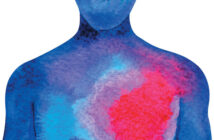BY , LMSW, ACM-SW
The COVID-19 pandemic is challenging our nation’s healthcare delivery system in unprecedented ways. Healthcare workers on the front lines compare the conditions to a war zone.1 The psychological burden of the pandemic affects all segments of our society. The intensity and duration of the COVID-19 emergency require resiliency to fight a long, sustained battle. Therefore, case managers must address the mental health issues created by COVID-19 resourcefully and adaptively for our patients, our colleagues, and ourselves. There is an increased risk of developing a mental health condition for the first time within 14-90 days of a COVID-19 diagnosis, according to a large study recently published in The Lancet.2 Anxiety, depression, and insomnia are the most common conditions detected. This study also found that the probability of an initial dementia diagnosis rises following a COVID-19 diagnosis for individuals over the age of 65.
Increased rates of mental health conditions have also been reported by Mental Health America (MHA), which has experienced a dramatic increase in the use of their online screening tools for anxiety and depression. In September 2020, MHA reported that 8 out of every 10 respondents scored moderate to severe symptoms of depression and anxiety, with 37% of respondents reporting frequent suicidal thoughts. That is the highest rate of suicidal ideation MHA has recorded since the launch of its screening program in 2014. Of concern, MHA notes that COVID-19 appears to impact young people under the age of 25 years most severely, with 90% of respondents screening for moderate-to-severe symptoms of depression and 80% having moderate-to-severe symptoms of anxiety. Over half of the respondents aged 11-17 reported frequent thoughts of suicide and self-harm in September 2020. MHA reports that the main factor contributing to these mental health conditions is loneliness and isolation.3
MHA also surveyed healthcare workers and found that 93% of respondents reported an increase in stress during the previous three months, and 82% reported an increase in emotional exhaustion. These workers are coping with excessive and prolonged stress. They feel overwhelmed, emotionally drained, and unable to meet constant demands. They are worried about exposure to COVID-19, and possibly infecting their families. These unrelenting stressors cause physical and emotional exhaustion that can lead to burnout. The World Health Organization (WHO) defines three dimensions of burnout:4
- Feelings of energy depletion or exhaustion
- Increased mental distance from one’s job, or feelings of negativism or cynicism related to one’s job
- Reduced professional efficacy
The mental health consequences of COVID-19 represent a growing national crisis for healthcare workers and the population at large. Before the pandemic, an estimated 50% of adults with a mental illness did not seek treatment,5 and 60% of youth with depression did not get any professional help.3 The unfortunate reality is that treatment for mental health conditions remains stigmatized, and people needlessly suffer due to shame and embarrassment. This is unacceptable at any time, but it is especially tragic given the scope and severity of the crisis we are facing together.
During times of stress like the COVID-19 emergency, mental health screening becomes especially important. Early identification and intervention for mental health conditions are as important as getting treatment for the first symptoms of physical health disorders. When we think about cancer, heart disease, or diabetes, we do not delay treatment for years; we begin with prevention immediately. The same approach should be applied to mental health conditions. A routine mental health screening should be conducted when symptoms such as loss of sleep, fatigue, appetite changes, feelings of depression, or anxiety develop. These early symptoms might not ever become a serious mental illness. However, if not addressed, they can worsen, and effective treatment might be delayed because of the stigma associated with mental illness. Online screening for mental health conditions is readily available and easy to use. A quick, free, and private mental health screen is available at www.mhascreening.org.
In addition to screening tools, MHA offers practical guidelines that all people can use to improve their mental health and increase resiliency. MHA has developed a toolkit called “Tools 2 Thrive” that highlights what individuals can do daily to prioritize their mental health, build resiliency in the face of trauma and obstacles, support those who are struggling and work toward a path of recovery. These measures include:
- Owning your feelings: It is important to recognize your emotions and own your feelings
- Finding the positive: Work to find the positive even when facing adversity or loss
- Connecting with others: Physical distancing during COVID-19 does not mean isolation from others. Stay connected through phone calls, video chats, and other creative means.
- Eliminating toxic influences: Remove those people in your life who are bringing you down.
- Creating healthy routines: Create healthy routines to take care of yourself.
These are practical steps that everyone can use to improve their mental health and increase resiliency regardless of their circumstances.
Recognizing that the resiliency of healthcare workers has an impact on patients, many organizations and workplaces have started support programs to help employees help one another during this time of crisis. For example, Brigham and Women’s Hospital in Boston launched a task force in 2004 to develop a support service for care providers. In New York, some organizations have redeployed their behavioral health staff and embedded them in interdisciplinary teams to support patients and families affected by COVID-19. Other facilities have created wellness support teams for staff that conduct outreach, provide telephonic counseling, and offer group support sessions. These programs require organizational commitment and an ability to listen and adapt. If your workplace is interested in starting a peer program, Peers for Progress offers resources on creating a sustainable program.6
Lessons learned from trauma-informed care can provide a pathway for healthcare workers and case managers during the COVID-19 pandemic. These lessons include:7
- Screening
- Interprofessional collaboration
- Understanding your history and reactions
- Understanding the health effects of trauma
- Patient-centered care and communication
As case managers, we specialize in resourcefulness and promote adaptive responses to complex problems. The challenges presented by the COVID-19 emergency are daunting, and our healthcare delivery systems are under siege. During this pandemic, the importance of integrating mental health and physical health has never been more critical. Case managers must be mindful of the psychological burden as well as the physical health impact of COVID-19 to build resiliency in ourselves, our clients, and our healthcare delivery systems. Most importantly, we must normalize mental health screenings as part of our assessment process to demystify mental health issues and to break down stigma.



